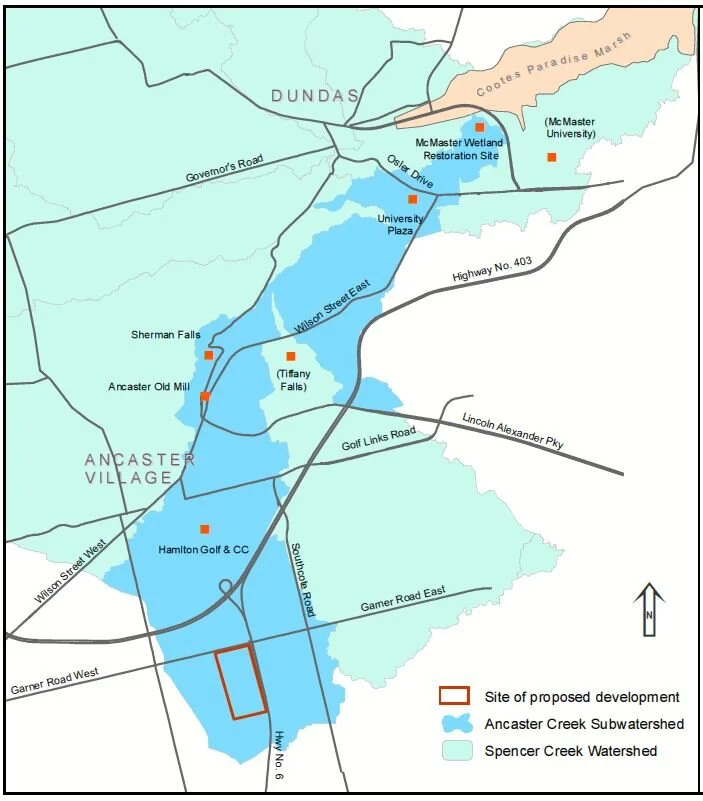Wetland struggle expanding
Wetland struggle expanding
The push to relocate a wetland and stream in the Ancaster Creek headwaters heads back to the Hamilton Conservation Authority board on Thursday after being deferred in the face of opposition that continues to grow. New information and new voices are bolstering the arguments against granting a permit for a multi-warehouse development at the corner of Garner Road and Highway 6.
The deferral came at the May 6 board meeting of the Authority at the request of the developers after the HCA received more than 60 letters urging it to reject the relocations. That occurred less than an hour after the Hamilton 350 Committee conducted an on-line “emergency rally” against the proposal.
As of Friday another 24 letters had been submitted and five individuals had registered to speak to the board on June 3. The new correspondence includes ones from founding HCA chair Tom Beckett, and from Brian McHattie, also a former HCA chair who was the ward one councillor from 2003 to 2014.
Beckett, a retired Superior Court Justice, reminded the HCA board members that they have an obligation to vote in the interests of the HCA not the developers. Referring to the threat to the Ancaster Creek headwaters and wetland, Beckett advised that Board members must reject this permit application and that “to vote otherwise would be a serious breach of ethics and the law.”
McHattie draws on his past position as “the Environment Canada wildlife habitat advisor to the Great Lakes Remedial Action Plans” and as lead author of a study on “How Much Habitat is Enough”, that is now in its third edition. He says that study recommends “at least 6 percent [wetland area] to ensure groundwater recharge, surface water retention, filtering out nutrients, and providing fresh cool water to sub-watersheds downstream, in this case Spencer Creek and on into Cootes Paradise.”
A 2008 study by the HCA found that wetlands now make up only 0.3 percent of the Ancaster Creek sub-watershed. That underlines McHattie’s contention that the Garner Road wetland is “all the more important to protect.”
A Hamilton Spectator report on the affected lands raises questions about the accuracy of the claims being made by the developers that the wetland is not significant. The farm family which operates the iconic Ancaster Pumpkin Patch on the property disputes the developer claim that only one toad inhabits the marsh.
They told the Spectator reporter about “frogs, toads, snakes, salamanders and many birds, including migratory ducks and swans that use the area as a resting spot.” The Book family say the calls from amphibians are “deafening” in spring and summer
HCA staff are recommending against the application which violates Conservation Authority, municipal and provincial policies although it could still be approved by the Authority board. The staff identify it as a “locally significant wetland” and also “a Core area” under Hamilton’s official plan. They also call the permit request “premature” because the project has not been vetted by city planning staff.
The developer initially approached the HCA last fall. In response a divided board ordered their staff to draft a policy that might permit relocation of wetlands under certain circumstances. That draft was presented in early April and has now been released for public comment over the summer. But the developers aren’t prepared to wait, another way in which their application is premature.
Ancaster Creek is also called Coldwater Creek because part of it supports cold water fish habitat. Downstream of the wetland it flows through the Ancaster Golf and Country Club and past the Old Mill Restaurant before going over Sherman Falls on the way to joining Spencer Creek near Cootes Drive adjacent to McMaster University.
The opportunity for citizens to delegate at the June 3 meeting passed before the agenda was posted but written comments can be sent to the Jaime.Tellier@conservationhamilton.ca
Find this article on the CATCH website here, along with the full archive of CATCH articles.



